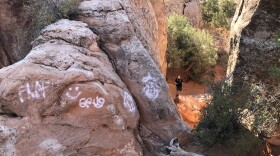-
As the storied independent film festival prepares to leave its longtime home, attendees and film industry insiders look back.
-
Ten Utah youth are suing the state over its issuance of permits for fossil fuels, which they say violates their rights to life, safety, and health. All of the plaintiffs reside in counties that have received an "F" grade from the American Lung Association due to their poor air quality. It's the latest in a series of climate lawsuits happening around the country.
-
A Moab resident discovered spray-painted graffiti in Arches National Park in the middle of the 44-day government shutdown. National parks have remained open during that time with little to no staff.
-
The Velvet-Wood Mine is located southeast of Moab, just miles from the Colorado state line. It hasn't been operational since the 1980s, but it's now part of the Trump administration's efforts to ramp up mineral extraction and energy production.
-
A Republican representative from the Mountain West led an effort Wednesday to remove a controversial provision to sell 450,000 acres of federal land in Nevada and Utah from the House reconciliation bill.
-
Tribal leaders and advocates rally against a controversial plan to sell public lands in Utah, NevadaRepublican representatives in Nevada and Utah this week were successful in getting an amendment to sell public lands in federal budget legislation. In Nevada, the idea is already facing strong opposition.
-
The three mineral-rich western states agreed to make their grids more resilient, build transmission lines together, and boost university research and private investment in energy.
-
Tribes defend Grand Staircase-Escalante in southern Utah as Trump Admin focuses on energy productionIn March, representatives of six tribes announced the formation of the Grand Staircase-Escalante National Monument Inter-Tribal Coalition to work to protect the national monument.
-
Public lands advocates worried that allowing Utah’s case to move forward would threaten to upend management of 200 million acres of public lands across the West.
-
A program in Utah is paying farmers to make their irrigation equipment more efficient, but researchers say it may not be saving as much water as it appears.

Play Live Radio
Next Up:
0:00
0:00
Available On Air Stations










